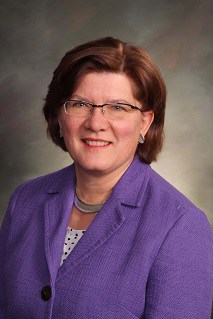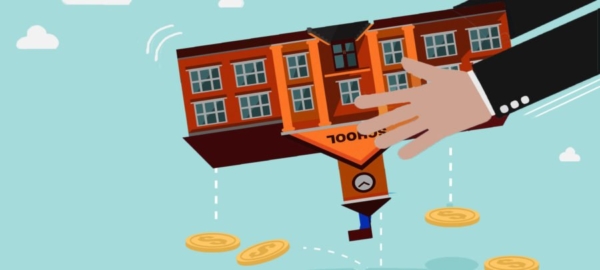Rep. Sue Wilson (R-Cheyenne) told legislators last summer that she thinks the Wyoming Education Options Act she’s sponsoring “will make everyone happy.”
Everyone, that is, except folks who think public funds should go to public schools—instead of churches, private schools, or homeschools.
House Bill 106 might as well be called: the Wyoming Gives Public Money to Private Religious and Home Schools Act. Because that’s what it would do.
Wilson’s bill would essentially create a school voucher program in Wyoming, albeit one that funnels money through parents instead of giving it directly to institutions.

The Laramie County representative describes her measure as an “education freedom” bill, because she claims it would give all students access to high-quality private schools usually reserved for wealthy kids.
But study after study has demonstrated that voucher programs do nothing to improve student achievement. Instead, they’re simply tools for people trying to defund public education in favor of private and/or religious education.
Voucher programs tend to hurt overall education in the places they’ve been set up, Wyoming Education Association President Grady Hutcherson told Better Wyoming.
“They result in poor learning outcomes for participating students,” he said, “and a disproportionate negative impact on low-performing and low-income students.”
A $65 million price tag
Under Wilson’s proposed program, the state would reimburse parents for half of their expenses to send their children to private schools, including “parochial, church or religious” ones.
Parents could also be reimbursed for half their costs to educate their kids at home, or arrange for them to be sent for school to another person’s home or “in another agreed upon location.”
Wyoming families can currently send their kids to private school or home school, but they can’t use state dollars that are designated for public schools.
“It is little more than a veiled excuse for politicians to dodge the inescapable issue before our state: Wyoming schools have are facing insurmountable shortfalls and need reliable sources of revenue.”
HB-106 would effectively begin to pay parents to opt out of public schools. Wilson claims this would improve school districts’ budgets, since the schools would no longer be responsible for educating these students.
But the Wyoming Education Department estimates there are 5,100 students who are currently not enrolled in public school, and they would become eligible for the program immediately.
If parents of all these students sought reimbursements, it would cost the state nearly $65 million in the first year—and much more if there’s a sudden exodus from public schools.

The Wyoming Legislature is already considering a $100 million cut to education this session, after previously cutting another $100 million over the course of the past four years.
Hutcherson, of the WEA, said bills like HB-61 are sold as vehicles for greater freedom in education. But it’s really a distraction by lawmakers who are afraid to do their jobs and raise taxes to fund public schools.
“In reality,” Hutcherson said, “it is little more than a veiled excuse for politicians to dodge the inescapable issue before our state: Wyoming schools have suffered too many budget cuts and are facing insurmountable shortfalls. Wyoming students need a reliable, stable source of revenue.”
Accountability, anyone?
Public schools have to answer for the quality of education they provide our children. Student progress is carefully tracked, and districts as well as the state make adjustments according to the data.

For students outside the public school system, accountability is essentially nonexistent.
Private, religious, and home schools have no obligation when it comes to transparency or accountability. HB-106 would require these schools to submit curricula, but with no mechanism to actually determine what is being taught—other than asking overextended public school administrators to play homeschool police.
The state would be cutting a check to pay for religious, private, and home schools without any clue whether those students were learning about climate change, Flat Earth Theory, calculus, Qanon, or anything else.
Thoughts and prayers instead of funding
Unsurprisingly, religious radicals are among the biggest cheerleaders for voucher programs like HB-106 would create.
The Family Policy Alliance, a “Christ-centered organization” that works to “advance biblical citizenship,” says it loves HB-106 and prays for its passage.
Wyoming is far behind in the “school choice” race to the bottom because our state constitution and supreme court provide vigorous protections for public education.
“It’s one of the most important bills of the 2021 legislative session because it can provide remarkably positive impact for families for generations to come,” former right-wing Wyoming legislator Nathan Winters wrote in a statement. “Wyoming has waited a long time to open educational opportunity, so we are far behind many other states in providing educational choice for families.”
In fact, as Winters should know, Wyoming is far behind in the “school choice” race to the bottom because our state constitution and supreme court provide vigorous protections for public education that have helped thwart many of these efforts.
With a budget crisis of historic proportions staring them in the face, however, and with their knees shaking at the thought of creating new revenues, Wyoming legislators might just be desperate enough to offer our state’s children the “thoughts and prayers” of a voucher program rather than the dedicated, dependable funding system they deserve.

